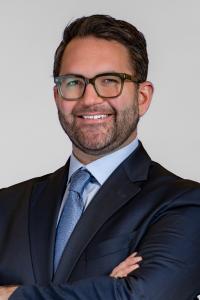Reflections on LGBTQ + Pride Month
Dr. Justin Neira on the Importance of Trust and Mentorship in Neurosurgery
Dr. Justin Neira always wanted to be a physician. At age five, he broke both his wrists and through a relationship with his orthopedic surgeon, became utterly fascinated with the world of medicine. While attending Cornell as an undergrad, Dr. Neira's passion for biology was further ignited through a concentration in neurobiology, studying animal behavior as it related to the brain.
Residency At Columbia
Following undergrad, Dr. Neira applied directly to medical school and was accepted to Columbia University's Vagelos College of Physicians and Surgeons. He says, "Seeing and understanding people's experience and the empathy that goes with being a physician made me choose this path."
As a native New Yorker, Dr. Neira was thrilled to return to NYC, a place of diverse professionals and patients to study medicine. It was in the OR where Dr. Neira fell in love with brain and spine surgery. "The amount of trust was incredible," Dr. Neira states, "I watched the doctors operate on the organ that makes you who you are. That unique doctor-patient trust and bond shaped my desire to specialize in neurosurgery."
Finding a Permanent Home at Columbia
After graduating, Dr. Neira now practices as a full-time attending neurosurgeon with a particular interest in spinal oncology, spinal cord tumors, degenerative spine disease (cervical, thoracic, lumbar), and spinal cord injury. "I found a home at Columbia," said Dr. Neira. "Our team members are all incredibly smart, operating at the cutting edge of their field and still deeply care about one another as people. I didn't have to pretend I was someone I wasn't. Being LGBT never factored in."
Dr. Neira's ability to connect across many disciplines has also helped him lead Columbia Neurosurgery's cross-campus surgical spinal oncology program with colleagues from oncology and radiation oncology.
Positively Affecting Patient Care
Dr. Neira says, "A key benefit to our culture of care is that Columbia is accepting of everyone and values diversity within ourselves and in our patient community. Everyone has a place here."
Dr. Neira also recognizes that patient recovery is multifactorial and continues long after the surgery, “Patients need a support system throughout this journey and the patient’s ability to remain honest and open with their provider is key. If we can advocate for them in multiple ways, we can help them beyond the surgery."
Looking to the Future
A 2021 study, Sexual and Gender Minority Identity in Undergraduate Medical Education: Impact on Experience and Career Trajectory, illustrates the importance of medical students feeling free to be themselves while still fully supported regardless of how they identify.
"In a changing world around identity and gender, to stay relevant and lead the field, our incoming residents need to represent the people that make up the future. When you're looking for mentors and can't find someone you identify with, sometimes you don't feel like you have a place. Here I always felt like I had a seat at the table."


